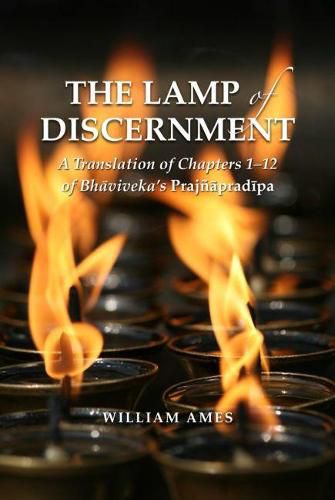The Lamp of Discernment: A Translation of Chapters 1-12 of Bhavaviveka's Prajnapradipa
William L. Ames

The Lamp of Discernment: A Translation of Chapters 1-12 of Bhavaviveka’s Prajnapradipa
William L. Ames
The Buddhist thinkers of medieval India addressed many of the issues that are still central to Buddhist praxis in the present. One of the most important of those thinkers is Bhaviveka, author of the work known as the Prajnapradipa. Over several years, William (Bill) Ames translated, carefully and precisely, the first twelve chapters of that work, which he has compiled and revised for consistency in this volume.
The Prajnapradipa is a commentary on Nagarjuna’s famous, and in the view of many famously difficult, Mulamadhyamakarika-Root Verses on the Middle Way. Central to all Buddhist thought in one form or another is an understanding that the common entities of our experience are transitory and, therefore, unreliable as grounds upon which to base our own happiness, satisfaction, security, and even our own sense of self. As Ames explains in his Introduction, the Madhyamaka pursues this insight further, asserting that all existing entities are lacking in (empty of, sunyata) any intrinsic nature (svabhava).
As systematized by later Tibetan scholastics, the Madhyamaka school is understood to have developed into two different forms, the Svatantrika and the Prasangika, a textbook style simplification that has had lasting influence. In this intellectual historiography where movements require specific founders, Bhaviveka is identified as the founder of the Svatantrika.
Part of the neo-Romantic rhetoric popular in the second half of the twentieth century was that meditation practice was by itself capable of leading to full awakening, or rather to an unimpeded, direct experience of the true and the real. That view has become increasingly untenable, as meditators have themselves attempted to understand the significance of their own experiences. Those who have turned to the teachings of the Buddhist tradition for that understanding are often confronted by the (only) apparent difficulty of understanding emptiness. Ames’ translation of this key work of the Madhyamaka school can contribute to untangling much of the confusion surrounding these ideas.
This item is not currently in-stock. It can be ordered online and is expected to ship in approx 4 weeks
Our stock data is updated periodically, and availability may change throughout the day for in-demand items. Please call the relevant shop for the most current stock information. Prices are subject to change without notice.
Sign in or become a Readings Member to add this title to a wishlist.

